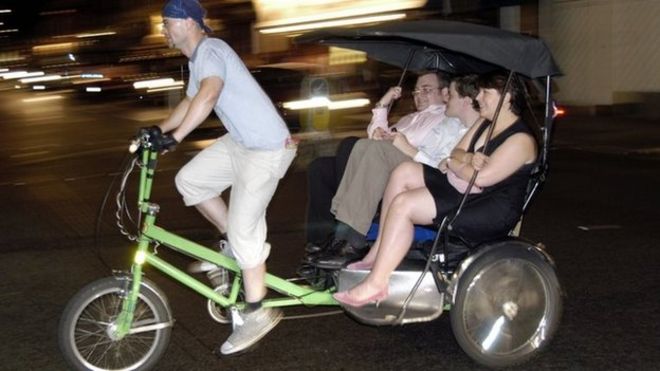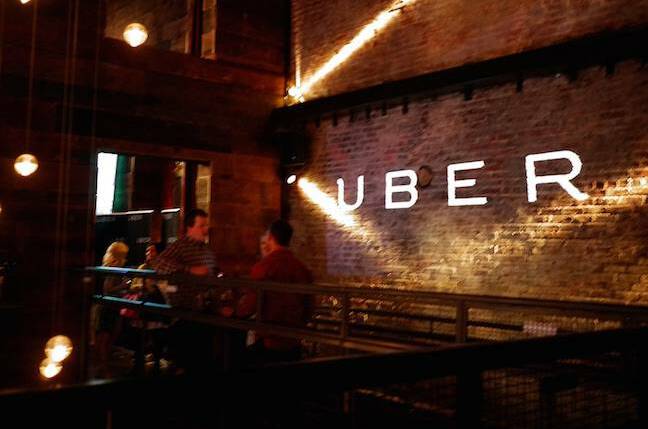Manchester PH working Uber In London.
Last weekend, two Manchester private hire cars were spotted working in central London using the Uber platform. Photos of both were captured and appeared on twitter.
Last weekend, two Manchester private hire cars were spotted working in central London using the Uber platform. Photos of both were captured and appeared on twitter.

Boris Johnson: No longer the cabbies’ friends
London’s black cab trade is dying and there is little anyone can do about it, Boris Johnson claimed today.
The London mayor faced down jeers and abuse from an audience of cabbies as he defended the “market forces” that threaten to put the historic trade out of business.
“You are dealing with a huge economic force which is consumer choice and the taxi trade needs to recognise that,” he told a meeting of the London Assembly.
“Everywhere I go I see yellow lights and I can see the taxi trade is dying and it grieves me, but it is very, very difficult to fight a huge change in consumer preference.”
He claimed the rise of Uber and other minicab apps meant that the trade’s decline was impossible to stop.
“I’m afraid it is a tragic fact that there are now more than a million people in this city who have the Uber app, ” he said to jeers from dozens of cabbies in the public gallery.
Faced with shouts about Uber drivers undercutting cabbies he shouted: “Yes they are. It’s called the free market.”
He suggested that cabbies were fighting a losing battle in trying to get the Uber app recognised as a taxi meter which would therefore require a licence.
He also rejected calls from Liberal Democrat London Assembly member Caroline Pidgeon to revoke Uber’s licence due to safety concerns.
Pidgeon claimed there is a huge problem with Uber drivers driving without insurance or background checks.
“We don’t currently think there are sufficient grounds to revoke their licence and I’m sorry that is the advice I have been given,” Johnson replied.
The mayor did say he would take measures to restrict the number of licenses issued to minicab drivers in order to reduce congestion.
There are currently around 80,000 minicabs in London, up from 50,000 when he first became mayor.
However, Boris’s refusal to take any further action against Uber means London now faces what cabbies described today as “the biggest ever taxi protest” next Tuesday.
Previous protests over the issue have brought London to a halt.
Responding to the threat of protest, Johnson replied: ” There’s a rail strike on Tuesday you might get some fares.”
Johnson previously had a lot of support among London taxi drivers, even enlisting some to distribute ‘Back Boris’ receipts during his first mayoral campaign.
However he was left visibly shaken today as received shouts of “clown” and “joke” from the assembled cabbies with one shouting “I voted for you once, I must have been on drugs,” while another shouted. “You want to be PM? You’re a joke.”
He added that any attempt to revoke their licence would be quickly overturned in the courts.

Boris Johnson has been making the argument to ban pedicabs since December 2012
Mayor Boris Johnson has announced he wants to ban rickshaws in London to help ease traffic congestion.
He does not have the authority to do that so he is seeking government legislation for a pedicab ban.
He also wants to reduce the number of minicabs, a move the Licensed Taxi Drivers Association has welcomed.
It estimates there were 13,000 new private hire drivers in London in 2014 partly owing to the rise in popularity of cheaper car booking apps like Uber.
Mr Johnson has been making the argument to ban pedicabs since December 2012 because, he said: “Although there are a number of responsible pedicab companies, the fact is that these vehicles jam up the capital’s roads and consistently fail to ensure the safety of their passengers.”
On any night in the West End you can’t miss the bells of Rickshaws (or Pedicabs as they are officially known) plying for trade.
While some tourists and the odd refreshed businessman seem to enjoy them, the authorities have wanted to get rid of them for a long time. While there are responsible operators, there is also a cowboy element where there are fears over safety and concerns over the amount they charge.
In 2002, I sat in court as the black cabbies tried and failed to get them banned. Pedicabs operate using a loophole in the metropolitan public carriage act 1869 and are classed as stage carriages not Hackney cabs and so can ply for hire. If the mayor wants them banned he will need to redo that legislation. That will take time and will probably involve legal challenges.
Transport for London (TfL) said there were 78,690 minicab drivers in London and over the past year that number had risen by 12,268.
Mr Johnson said: “We must be able to take action against the threat posed by the massive increase we are seeing in the number of private hire vehicles.
“There are only 25,000 black cabs and 8,000 buses in London and yet there are already over 75,000 minicabs and rising. We’re starting to see a threat to free movement of traffic on the roads.
“We will also be seeking powers for TfL over pedicabs – which so far have been completely immune from regulation.”
Labour London Assembly member Val Shawcross said action was needed to make rickshaws safer, but a complete ban was unnecessary.
“A blanket ban is a step too far,” she said.
“What is needed is a much greater level of control, with just a limited number of licences given to operate for tourists in a small number of safe locations.
“If Londoners want to use them for their personal use that is their choice, but let’s be clear that rickshaws should not be operating as taxis.”
The Mayor is seeking to include the legislation in a London Bill in this year’s Queen’s speech.
Source: BBC

Australia’s Taxation Office has issued a guidance note titled “Providing taxi travel services through ride-sourcing and your tax obligations” that makes it clear Uber drivers need to register for, collect and pay the nation’s goods and services tax (GST).
The note coins the term “ride-sourcing” and defines it as “an ongoing arrangement where”:
And here comes the stinger for ride-sourcers:
”If you provide ride-sourcing services, you are providing ‘taxi travel’ services. This is because you make a car available for public hire and use it to transport passengers for a fare.Under the GST law, if you carry on an enterprise and you provide taxi travel services in that enterprise you are required to be registered for GST regardless of your turnover.”
That’s a nasty requirement because Australian businesses that turn over under AU$75,000 a year don’t have to register for GST and are therefore spared quarterly paperwork and the chore of setting aside the tax and forwarding it to government. Ride-sourcers will also have to prove how much of their time on the road is spent providing taxi services if they wish to claim a credit on GST.
It’s also nasty for Uber, for two reasons. The first is that the ATO has given ride-sourcers an August 1st deadline to get their GST affairs in order, which means Uber has some back office work to do in a hurry. The other hassle for Uber is that it currently manages to get away with saying its transactions effectively take place offshore so don’t incur GST. Once its drivers are required to register for GST, Uber will either have to eat the price rise the tax will bring – and the competitive slug – or go rogue again. Doing so probably isn’t an option unless Uber wants to be accused of astounding hypocrisy to go with its general skulduggery: the company has been telling Australian authorities they should loosen regulations to allow it to compete hereabouts. Arguing it wants access to Australia’s market without being subject to Australian tax laws would require amazing chutzpah, even for Uber! ®